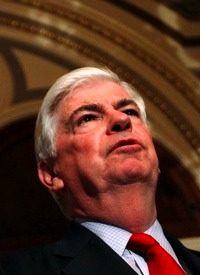
Senate Democrats beat back a Republican alternative amendment to Connecticut Democrat Christopher Dodd’s Restoring American Financial Stability Act of 2010 (S. 3217) and will soon consider an amendment to audit the Federal Reserve Bank authored by Louisiana Republican David Vitter. The GOP substitute amendment failed in a 38-61 vote May 6.
Republicans on the Senate Banking Committee oppose the bill as written because it would “entrench ‘too big to fail’ financial institutions as a permanent part of the U.S. financial system, thereby perpetuating the unfair advantages these large institutions enjoy over their smaller competitors and increasing the risk of U.S. financial system instability.” Indeed, the bill would guarantee future bailouts of financial firms by creating a new financial services tax and creating a $50 billion revolving bailout fund.
Even Treasury Secretary Timothy Geithner has acknowledged that “a standing fund would create expectations that the government would step in to protect shareholders and creditors from losses. In essence, a standing fund would be viewed as a form of insurance for those stakeholders.”
The primary argument for the American Financial Stability Act of 2010 has been that government should stop excessive risk-taking by financial firms. In a free market, firms that take lots of foolish risks go bankrupt and are removed from the economy (thus ending the threat). The threat of bankruptcy offers a strong incentive for prudent business practices. But the Senate legislation would end the need for risk considerations by the firms, perpetuating and exaggerating risky behaviors. No matter how foolish the investment, under the Senate bill financial firms on the losing side of a financial bet would always be able to call on government bailouts in the future.
But the Democratic proposal would also create a Financial Stability Oversight Council and further empower the Federal Reserve Bank to regulate banks, bank holding companies, and other financial firms. In short, the bill would allow any investment risks that federal government regulators find acceptable and ban any regulators find unacceptable.
Audit the Fed
The financial “reform” bill as passed by the House did have one positive measure, Representative Ron Paul’s amendment to audit the Federal Reserve Bank (H.R. 1207). But the Senate version introduced for floor consideration does not require the General Accountability Office audit transactions of the Federal Reserve. “Senator Sanders’ amendment,” Rep. Paul warned in a press statement, “still contains important disclosure requirements but stops short of the full audit called for in my amendment that passed the House last fall. Senator Vitter’s amendment calling for a full audit would give GAO the authority it needs to ensure that the Fed is fully transparent and I have been told that it will be voted on next Tuesday. The American people deserve to know what the Fed has been up to and how their Senators stand on the issue of a full audit.”
The Federal Reserve — by suppressing interest rates below free market rates for nearly a decade before the crash — is without a doubt the government agency primarily responsible for the current “Great Recession.” A major secondary reason for the most recent boom-bust cycle was the guarantee against risk banks enjoyed from federally chartered mortgage companies such as Fannie Mae and Freddie Mac. Together, these two federal agencies ended up guaranteeing three-quarters of all home mortgages against default by 2008. Both required tens of billions in federal bailout funds in 2009.
Senator Richard Shelby (R-Ala.), speaking for Senate Banking Committee Republicans in a May 9 press statement, explained that reform legislation cannot continue to allow government entities to shield private banks against risk in an unrestricted manner without repeating another crash. “Republicans believe that meaningful financial reform is necessary,” Shelby said. “At its core, the recent financial crisis stemmed from a meltdown in the mortgage market. At the heart of this market lie the government sponsored housing agencies Fannie Mae and Freddie Mac. For decades, these multi-trillion dollar institutions leveraged the implicit backing of the American taxpayer to encourage mortgage lending to people who could not afford to repay the loans. But when home prices finally collapsed, these ticking time bombs imploded, saddling taxpayers with hundreds of billions of dollars of debt. This situation remains unresolved today. In fact, Freddie Mac just this week asked for another $10.6 billion of your dollars…. These major contributors to the crisis remained unscathed.”
The role of federal insurance against the risky bets of mortgage security brokers has only increased the exposure of taxpayer bailouts and more foolish home mortgage loans since the housing bubble burst. “Government-related entities backed 96.5% of all home loans during the first quarter, up from 90% in 2009, according to Inside Mortgage Finance,” the Wall Street Journal reported April 30. “The increase was driven by a jump in the share of loans backed by Fannie Mae and Freddie Mac, the government-owned housing-finance giants.”
At the height of the crisis in 2008 Fannie Mae and Freddie Mac alone guaranteed 75 percent of all home mortgages in the U.S. housing market, with other U.S. government corporations such as Ginnie Mae playing a tiny role. Ginnie Mae and other federally chartered entities have increased their exposure to the U.S. housing market since 2008.
The Senate legislation would do nothing to stem the tide of increased home mortgage guarantees by government-chartered companies like Fannie Mae and Freddie Mac. In addition, the legislation would grant federal regulators more authority to regulate which investments are too “risky” and which are acceptable. The Senate financial “reform” legislation is the perennial cry of government: “We failed, so give us more power and money.”
Photo of Sen. Christopher Dodd: AP Images
Related article:



